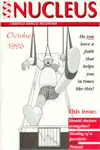If this seems daunting, one of CMF's Confident Christianity training days (page 24) will certainly help you gain confidence in talking to others about Jesus- with gentleness and respect. But theory only takes us so far. At some point we need to come out of the woodwork and just give it a go. (House-officers learn all of their medicine on the job!) Asking patients, 'Do you have a faith which helps you at times like this?' requires courage- yet with practice slips easily into a routine clerking. There is no pressure to 'capitalise' instantly on the reply. Sometimes the opening may be obvious. If not, this acute-phase gathering of information will allow us later to return, remind them of the instance, and sensitively follow it up. 'Have you ever thought about...?'
If I learnt one lesson in Poland this summer (see page 17) it is that God's Spirit is in control, ripening the fruit as he chooses. He simply requires workers willing to give the trees a good shake. Even an inept old one-eyed cow can shake a tree. We can surely give each of our patients a spiritual prod. All that he asks of us is to be faithful in each situation, not to worry about the big picture- which can be paralysing- but simply to 'Trust in the Lord and do good' (Ps 37:3). Whether or not the fruit falls is not our problem- and our spiritual health and obedience should not depend on apparent 'success' or lack of it. We may take a hundred spiritual histories before one soul thirsting for God responds.
As Jesus' healing of the paralytic demonstrates (page 13) we need to take steps to integrate physical and spiritual healing in our own practice. Sir Albert Cook of Mengo Hospital, Uganda wrote:
'To attempt to heal the suffering is much
To carry the water of salvation to thirsty souls is more
But to combine the two is the greatest work a man can hope'































